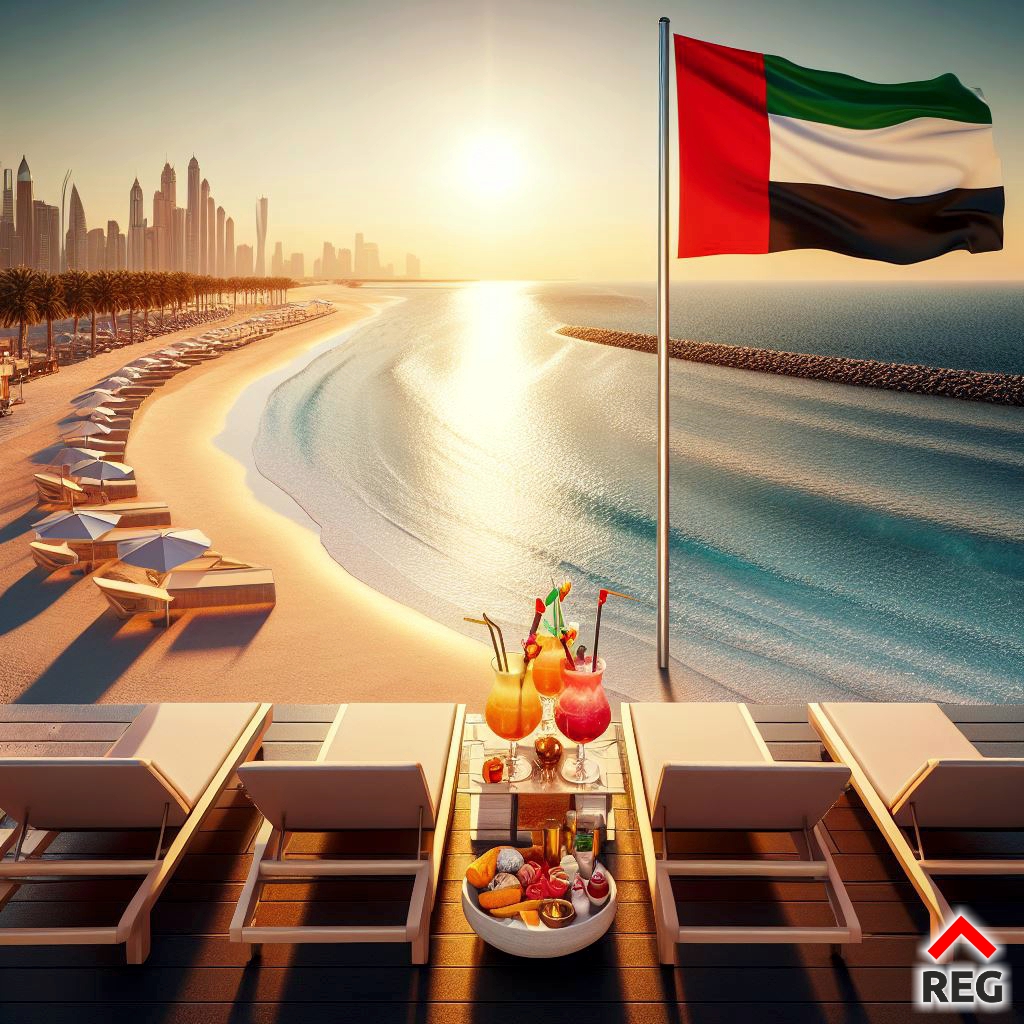Looking to buy property in Dubai? Write to us on WhatsApp and we will select the best options for you. Everybody buys from us!
Chapter 5: Return and Risk of Buying and Selling or Renting Luxury Apartments in Dubai.
Buying and selling or renting luxury apartments in Dubai are two common strategies for property investment in the city. However, each strategy has its own advantages and disadvantages, depending on various factors, such as the market conditions, the property location, the property quality, the property price, the taxes and fees, the risks and insurance, and the investor’s goals and preferences. In this chapter, Real Estate Group will compare and contrast the two strategies and provide some statistics and information for 2021, 2022 and 2023.
Buying and Selling Luxury Apartments in Dubai.
Buying and selling luxury apartments in Dubai is a strategy that involves purchasing a property at the initial stage of construction and reselling it after the completion of construction, usually at a higher price. This strategy can generate a return in percentage on the invested capital, which is the difference between the selling price and the buying price, divided by the buying price, multiplied by 100. The return in percentage on the invested capital can vary depending on the demand and supply of the property, the appreciation and depreciation of the property value, and the negotiation and bargaining skills of the investor.

According to some sources, the average return in percentage on the invested capital for buying and selling luxury apartments in Dubai in 2021 was around 10% to 15%, depending on the area and the project. For example, a luxury apartment in DAMAC Hills 2 that was bought for AED 1.5 million in 2020 could be sold for AED 1.8 million in 2021, generating a return of 20% on the invested capital. However, the return in percentage on the invested capital for buying and selling luxury apartments in Dubai in 2022 and 2023 is expected to decrease slightly, due to the increase in supply and competition, the decrease in demand and affordability, and the uncertainty and volatility of the market. According to some projections, the average return in percentage on the invested capital for buying and selling luxury apartments in Dubai in 2022 and 2023 will be around 8% to 12%, depending on the area and the project. For example, a luxury apartment in Dubai Marina that was bought for AED 2 million in 2021 could be sold for AED 2.2 million in 2022 or 2023, generating a return of 10% on the invested capital.
However, buying and selling luxury apartments in Dubai also involves paying some taxes and fees, which can reduce the return on investment. Real Estate Group lists the following taxes and fees that must be paid by the buyer and seller:
1. Transfer fee: This is a fee that is payable to the Dubai Land Department (DLD) for transferring the ownership and the possession of the property from the seller to the buyer. The transfer fee is usually 4% of the property value, which is payable by the buyer or the seller or both, depending on the agreement.
2. Legal fees: These are fees that are payable to a professional lawyer for reviewing and drafting the legal documents and contracts, and representing the buyer or the seller in the legal and financial formalities. The legal fees are usually around 1% of the property value, which are payable by the buyer or the seller or both, depending on the agreement.
3. Brokerage fees: These are fees that are payable to a real estate broker for providing the services and assistance for the sale and purchase of the property, such as market research, property search, property valuation, property inspection, property reservation, property registration, property transfer, property management, and property resale or rental. The brokerage fees are usually around 2% of the property value, which are payable by the buyer or the seller or both, depending on the agreement.
4. Registration fees: These are fees that are payable to the DLD for registering the property and issuing the title deed. The registration fees depend on the value of the property. For properties valued below AED 500,000, the registration fees are AED 2,000 plus 5% VAT. For properties valued above AED 500,000, the registration fees are AED 4,000 plus 5% VAT.
5. Mortgage registration fees: These are fees that are payable to the DLD for registering the mortgage loan and issuing the mortgage certificate, if the buyer or the seller is using a mortgage to pay for the property. The mortgage registration fees are usually 0.25% of the loan amount plus AED 290.
6. Valuation fees: These are fees that are payable to a professional appraiser for valuing the property and issuing the valuation report, which is required by the bank for approving the mortgage loan, if the buyer or the seller is using a mortgage to pay for the property. The valuation fees are usually AED 2,500 to 3,500.
7. Service charges: These are fees that are payable to the developer for maintaining and managing the common areas and facilities of the project, such as the lobby, the elevator, the pool, the gym, and the security. The service charges are usually around 2% of the property value, which are payable annually by the buyer or the seller or both, depending on the agreement.
Renting Luxury Apartments in Dubai.
Renting luxury apartments in Dubai is a strategy that involves purchasing a property and leasing it out to tenants for a long-term rent, usually for one year or more. This strategy can generate a return on the invested capital, which is the annual rental income divided by the property value, multiplied by 100. The return on the invested capital can vary depending on the rental demand and supply of the property, the rental price and the occupancy rate of the property, and the management and maintenance skills of the investor.
According to some sources, the average return on the invested capital for renting luxury apartments in Dubai in 2021 was around 6% to 8%, depending on the area and the project. For example, a luxury apartment in Dubai Marina that was bought for AED 2 million in 2020 could be rented for AED 120,000 per year in 2021, generating a return of 6% on the invested capital. However, the return on the invested capital for renting luxury apartments in Dubai in 2022 and 2023 is expected to increase slightly, due to the decrease in supply and competition, the increase in demand and affordability, and the stability and recovery of the market. According to some projections , the average return on the invested capital for renting luxury apartments in Dubai in 2022 and 2023 will be around 7% to 9%, depending on the area and the project. For example, a luxury apartment in Palm Jumeirah that was bought for AED 3 million in 2021 could be rented for AED 240,000 per year in 2022 or 2023, generating a return of 8% on the invested capital.
However, renting luxury apartments in Dubai also involves paying some taxes and fees, which can reduce the return on investment. Among the taxes and fees that must be paid by the buyer and landlord, Real Estate Group, below, lists them:
1. Rental income tax: This is a tax that is payable to the UAE government for the income generated from renting the property. The rental income tax is usually 5% of the annual rental income, which is payable by the landlord.
2. Service charge: This is a fee that is payable to the developer for maintaining and managing the common areas and facilities of the project, such as the lobby, the elevator, the pool, the gym, and the security. The service charge is usually around 2% of the property value, which is payable annually by the landlord.
3. Agency commission: This is a fee that is payable to a real estate broker for providing the services and assistance for the rental of the property, such as marketing, pricing, negotiating, and managing. The agency commission is usually around 5% of the annual rental income, which is payable by the landlord or the tenant or both, depending on the agreement.
4. Maintenance fee: This is a fee that is payable to a professional contractor for repairing and replacing the defects or damages in the property, such as cracks, leaks, stains, or malfunctions. The maintenance fee depends on the type and the extent of the defect or damage. The maintenance fee is usually payable by the landlord or the tenant or both, depending on the agreement.
5. Utility bills: These are bills that are payable to the utility providers for the consumption of the water, electricity, gas, internet, and phone services in the property. The utility bills depend on the usage and the tariff of the utility services. The utility bills are usually payable by the landlord or the tenant or both, depending on the agreement.
Renting luxury apartments in Dubai also involves some risks and insurance, which can affect the return on investment. Among the risks and insurances that a buyer and landlord should consider, Real Estate Group predicts the following:
1. Vacancy or eviction of the tenant: This is a risk that the landlord may face if the tenant leaves or is forced to leave the property, due to various reasons, such as non-payment, breach of contract, or personal circumstances. This risk can result in the loss of the rental income, the increase of the vacancy rate, and the decrease of the occupancy rate of the property. The landlord should consider the tenant screening and the tenancy contract, which can cover the background check, the credit check, the references, and the terms and conditions of the tenancy, such as the rent, the deposit, the duration, and the notice period of the tenancy. The tenant screening and the tenancy contract are usually provided by a broker and paid by the landlord or the tenant or both, as part of the agency commission.
2. Damage or theft of the property or the contents: This is a risk that the landlord may face if the property or the contents are damaged or stolen, due to various reasons, such as accidents, vandalism, or burglary. This risk can result in the reduction of the value, the comfort, and the safety of the property and the contents, and the increase of the cost, the time, and the hassle of the landlord. The landlord should consider the property insurance and the contents insurance, which can cover the fire, flood, earthquake, and theft risks of the property and the contents, such as loss, damage, or injury. The property insurance and the contents insurance are usually provided by an insurance company and paid by the landlord as a separate premium.
3. Disputes or lawsuits with the tenant or the other party: This is a risk that the landlord may face if the tenant or the other party breaches the contract or violates the law, due to various reasons, such as fraud, misrepresentation, or negligence. This risk can result in the delay or cancellation of the rental, the loss or damage of the property or the contents, and the legal and financial liabilities of the landlord. The landlord should consider the legal fees and the legal documents and contracts, which can cover the review and the drafting of the legal documents and contracts, and the representation of the landlord in the legal and financial formalities. The legal fees and the legal documents and contracts are usually provided by a lawyer and paid by the landlord as part of the legal fees.
4. Changes in the market conditions or the regulations: This is a risk that the landlord may face if the market conditions or the regulations change, due to various reasons, such as economic, political, or social factors. This risk can result in the fluctuation of the rental price, the demand, and the supply of the property, and the alteration of the rules, the fees, and the taxes of the property. The landlord should consider the market analysis, the financial modeling, and the risk assessment of the property, which can cover the current and the future trends and scenarios of the market and the regulations. The market analysis, the financial modeling, and the risk assessment of the property are usually provided by a broker or an accountant and paid by the landlord as part of the brokerage fees or the accounting fees.
Below, Real Estate Group provides some tips and advice on buying apartments in Dubai:
Dubai is one of the most attractive and lucrative destinations for buying apartments, whether for investment or residential purposes. The city offers a high quality of life, a stable and diversified economy, a secure and tolerant environment, and a vibrant and cosmopolitan culture. Dubai also boasts some of the most innovative and spectacular real estate projects in the world, ranging from affordable to luxurious, from off-plan to ready, and from urban to suburban. Buying apartments in Dubai can provide many benefits, such as high return on investment, visa for residency, freehold ownership, and continuous improvement and innovation. However, buying apartments in Dubai also involves some challenges, such as taxes and fees, risks and insurance, market fluctuations, and legal formalities. Therefore, potential foreign buyers and investors need to be well-informed and well-prepared before making a decision.
Here are some tips and advice for buying apartments in Dubai:
Do your research: Before buying an apartment in Dubai, you should do your homework and gather as much information as possible about the market, the area, the project, the developer, and the property. You can use various sources, such as online portals, newspapers, magazines, reports, brochures, and word-of-mouth. You can also consult with professional experts, such as real estate brokers, lawyers, accountants, appraisers, and inspectors. You should compare and contrast different options and evaluate the pros and cons of each one. You should also consider your goals, preferences, budget, and timeline, and choose the option that best suits your needs and expectations.
Choose a reputable developer: One of the most important factors to consider when buying an apartment in Dubai is the reputation and track record of the developer. You should choose a developer that has a proven history of delivering quality projects on time and according to the specifications. You should also check the developer’s license and escrow account details, which indicate the legitimacy and security of the developer and the project. You should avoid developers that have a history of delays, cancellations, defects, disputes, or lawsuits. You should also visit the developer’s website and previous projects, and read the reviews and testimonials of the previous buyers and investors.
Looking to buy property in Dubai? Write to us on WhatsApp and we will select the best options for you. Everybody buys from us!
Negotiate the best deal: When buying an apartment in Dubai, you should always try to negotiate the best deal possible, whether it is the price, the payment plan, the terms and conditions, or the incentives. You should use your research, your expertise, and your bargaining skills to get the most value for your money. You should also be flexible and realistic, and be ready to compromise and accept a fair and reasonable offer. You should also be aware of the market trends and the demand and supply of the property, and be prepared to act fast and decisively when you find a good opportunity.
Hire a professional broker: Buying an apartment in Dubai can be a complex and lengthy process, which requires a lot of knowledge, experience, and skills. Therefore, it is advisable to hire a professional real estate broker, who can guide and support you throughout the process. A professional broker can help you with market research, property search, property valuation, property inspection, property reservation, property registration, property transfer, property management, and property resale or rental. A professional broker can also help you with legal and financial formalities, such as preparing and submitting the documents, coordinating with the developer and the Dubai Land Department, and arranging the payment method. A professional broker can also help you with negotiating the best deal, resolving any issues or disputes, and protecting your rights and interests. A professional broker usually charges around 2% of the property value as a commission, which is payable by the buyer or the seller or both, depending on the agreement.






